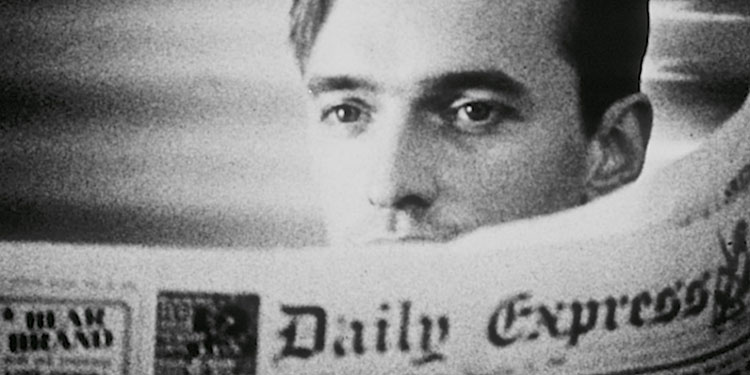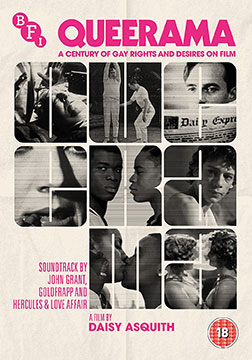
Director: Daisy Asquith
Running Time: 70 mins
Certificate: 18
Release Date: March 26th 2018 (UK)

Director Daisy Asquith’s mixture of archive footage and music is the sort of film that is likely to beguile and entrance some viewers while leaving others perplexed and a bit bored. That’s essentially the nature of the beast though, as there’s no traditional voiceover or simplistic signposting (barring a few title cards) in this journey through decades of queer footage from the BFI (British Film Institute). It’s done somewhat chronologically and somewhat thematically (more the latter than the former), with the whole thing held together by the music of John Grant, Goldfrapp, and Hercules And Love Affair.
At first it feels a little random, taking its time to get the audience accustomed to the way it cuts between its multiple sources, sometimes showing chunks of historic TV documentaries interspersed with footage of queer lives from films and shorts, or using music or a particular interview to thematically anchor what you’re seeing on screen. Through this it starts to build something surprisingly powerful, paying testament to both LGBTQ lives in Britain over the past century and celebrating (and sometimes reproaching) the way queer lives have been depicted on screen.
It’s difficult not to be struck by how much footage there is – and for that we should thank the always forward-thinking BFI National Archive, which was collecting footage about LGBT people even when gay sex between men was illegal – and how diverse it is. Anyone who thought the only gay films were Brokeback Mountain and Call Me By Your Name will be surprised by just how much British gay footage there is from decades past. Some of it is overtly gay, some covertly, and some almost anthropological in tone.
Asquith weaves it all together in a way that’s playful but also informative. For example, one section thematically focuses on sex. It’s both sexy and fascinating, showing the different ways gay sexuality has been shown on screen, from the needlessly chaste to the deliberately in-your-face.
Voiceover comes solely from the historic footage, whether it’s the 1960s TV documentaries ‘Homosexuals’ and ‘Lesbians’ – which help put past mainstream ideas about LGBT people into perspective – or Quentin Crisp talking in a way that’s more nuanced and smarter than he’s usually credited for about the double-edged sword of acceptance. It helps guide the viewer while leaving them to their own thoughts. For some it may be frustrating that the cross-cutting of clips means you don’t necessarily know where that scene came from or when it was filmed, but equally that openness allows you to bring your own experiences to this fascinating cornucopia of the gay experience on screen.
The music is also a tremendous guide, with John Grant’s wonderful lyrics and melodies – he often manages to be simple and complex simultaneously – helping to pull the viewer through sections that concentrate on the changes in gay lives from before partial legalisation of gay male sex in 1967 to the 1990s. The film shows how laws and attitudes have changed, but more than the purely factual it’s interested in the lives of queer people and how they have changed (both the change on the ground and how they’re depicted).
Asquith also noticeably avoids the trap of gay projects, which is to assume everything is about gay men. There’s a rich and balanced amount of footage of both men and women, and while trans/genderqueer themes aren’t at the forefront, they are acknowledged and woven into the tapestry.
The special features include the full 1960s This Week documentaries ‘Homosexuals’ and ‘Lesbians’, which feature prominently in Queerama. They are films that often pop up in gay British documentaries, as they are rare examples of mainstream TV looking head-on at gay people before the law was changed in 1967. They are undoubtedly products of their time, but they’re also surprisingly empathetic and interesting to watch, and having seen bits of them so many times, it was nice to be able to see them in their entirety. There are also a couple of short films that feature in the movie, and also a Q&A with the director. That’s well worth a look as it discusses how the movie came into existence and the difficulties they faced clearing rights (which also explains the absence of some key films).
Overall Verdict: Queerama is not a film for those who like a nice clear voiceover telling them what to think, but for those happy to meet the film on its thematic and musical terms, it’s a great way to allow decades of British LGBT lives on screen to wash over you.
Reviewer: Tim Isaac
Leave a Reply (if comment does not appear immediately, it may have been held for moderation)